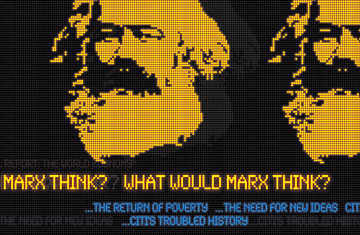
(3 of 4)
Roland Wölfl, who heads the Trier office of Germany's powerful IG Metall labor union, maintains that employers and union officials are rallying to save jobs. "We're all pulling on the same rope," he says. Like many in Germany, he believes that this social-solidarity system has been badly strained over the past few years, as budget cuts were implemented and American-style practices came into vogue, including a focus on short-term profits over longer-term prosperity, broad deregulation and fast-and-loose finance. In the auto industry, where IG Metall is a powerful force, firms like Volkswagen threatened to move jobs abroad unless workers made big concessions on pay and working hours. But now peace has been restored, and Wölfl says the clock needs to be turned back. "Uncontrolled turbo-capitalism has lost its reason to exist," he says.
Could old-fashioned German values, including consensual labor relations, be a model for others now? At the chamber of commerce, which is housed on the site of a former French garrison, Rössel shakes his head. "I think Germany will get through this crisis better than the U.K. and U.S. because it's less dependent on finance," he says. "But you can't impose a social market economy by law. It developed over decades. It's cultural."
Sarko's Stick
Next stop is Paris, a city that played an important role in Marx's life and work. He moved there in 1843 after tangling with authorities in Germany, and it was there that he met Engels, his intellectual soulmate and collaborator. The French revolts of 1830, 1848 and 1871 strongly influenced Marx's thinking on class struggle and revolution.
These days, the stick that Marx used to beat capitalist excesses has been taken up — albeit more lightly — by French President Nicolas Sarkozy. Even before the financial crisis exploded last fall, Sarkozy was attacking outsized corporate pay packages and "golden parachutes" for fired executives. He has also called for the "moralization" of capitalism, by which he means a greater sense of social and personal responsibility on the part of businesses, a significant reining in of financial speculation and a renewed emphasis on entrepreneurship and work. "I believe in the creative force of capitalism, but I am convinced that capitalism cannot survive without an ethic, without respect for a number of spiritual values, without humanism, without respect for people," the French President said in a February, 2007 speech that articulated a critique he has since considerably strengthened. This month Sarkozy talked about how the public was "scandalized" by highly paid bankers' lack of accountability for the financial system's woes.
Such rhetoric plays well in France, where public opinion has long been skeptical about free markets and globalization — and where the founding Republican principle of égalité is viewed as paramount. France has actually benefited from globalization; one in seven people in the country is employed by a foreign company that has invested in the country, and large French firms such as l'Oréal and Danone have boosted their profits as a result of their global reach. But some of the fears are well founded. Globalization has brought massive pressure on wages in developed countries and a widening gulf between the rich and everyone else around the globe. Executive pay has soared: according to a study by the International Institute for Labour Studies, the CEOs of the 15 largest companies in Australia, Germany, Hong Kong, the Netherlands, South Africa and the U.S. earn between 71 times and 183 times as much as the average employee in those nations. Some studies show that in the U.S., the average inflation-adjusted wage of workers has actually fallen over the past 30 years. "Nobody ever claimed the market economy would produce social justice," says Joseph Stiglitz, the Nobel Prize – winning American economist, who says that today's problems "are much deeper than the failure of financial markets."
Stiglitz was one of an all-star cast invited to Paris in January to take part in a two-day seminar titled "New World, New Capitalism." The gabfest was organized by a man who personifies today's intellectual flux: Eric Besson, a rising star in the French Socialist Party who switched over to Sarkozy's conservative camp before the 2007 presidential election and has gone on to a stellar career in government. "One of the rare positive effects of the crisis is the way that it has opened up people's minds, creating an intellectual window of opportunity," Besson says.